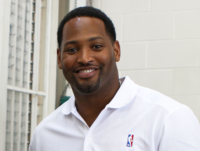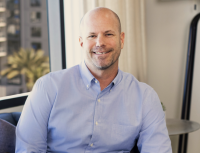Robert Horry's daughter, Ashlyn, spent the first six months of her life at Texas Children's Hospital in Houston hooked up to oxygen.
Not diagnosed immediately, Robert and his ex-wife, Keva, found out that Ashlyn was born with 1p36 deletion syndrome, a rare genetic disorder that causes intellectual disabilities due to a deletion of genetic material in chromosome 1. The condition is most common in females and can result in distinct facial features, limited muscle tone and seizures, according to the National Institutes of Health.

After years of the parents caring for Ashlyn by learning how to clean and remove her medical instruments and taking her to physical therapy, while Robert juggled a 16-year NBA career, Robert retired from the league in 2008.
"When I was in the NBA, it was 100% covered," Robert told Fierce Healthcare. "Whatever the bill was, they covered it. I know it got to a point where it was an 80/20 split."
Robert won seven NBA championships in his career, winning the NBA Finals twice each with the Houston Rockets and San Antonio Spurs and three times with the Los Angeles Lakers. The Alabama alum played with legends such as Hakeem Olajuwon, Kobe Bryant, Shaquille O'Neal and Tim Duncan.
He knew he was fortunate the league was there to cover huge medical expenses, but he knew most families were not so lucky. He recalled seeing parents in the waiting room making a judgment as to whether they should waive parental rights so the state could provide care for their children since it was so costly.
Once he retired, Robert initially went on COBRA, insurance coverage for people changing jobs. X-rays, even in the 1990s, he said, came out to $5,000 to $10,000. And even though other parents he met might have pretty good insurance, like a 90/10 split, some bills were so expensive that even paying 10% could still be devastating.
"The NBA has great insurance, but once you retire, it's a whole other world," he said.
Though some people affected with 1p36 can live into early adulthood, others die in childhood. But Ashlyn was a fighter, ultimately living until she was 18 from 1994 to 2011.
Horry joins SureCo
Robert was at an unrelated charity event when he bumped into the leadership team of SureCo, a company that facilitates the administration of individualized health plans through ICHRA.
"One of the best things about ICHRA is that it allows people to find the plan that fits their specific needs," said SureCo Chief Operating Officer Erik Wissig. "Group plans will put together one, two, maybe three options, none of which likely fit anyone's specific needs."
ICHRA, on the other hand, finds individual plans with the right providers, cost structures and conditions, effectively making the employer just a vehicle for financial support.

"To Robert's situation, he fits that category," said Wissig. "He had a very, very specific situation with likely specific physicians and specific facilities."
Horry shared his story. Following the charity event, he reached out to ask how he could help advance the company's goals. He was met with surprise by the request, but SureCo immediately agreed to bring him on board. Horry's appreciation for SureCo is genuine, he says, because he rarely puts his name on things and never on things he doesn't believe in.
After sitting down several years ago, Horry has slowly become more accustomed to the nuts and bolts of the health industry.
"I'm coming from a basketball world into an insurance world, which is bananas," Horry explained. "I think they've been inching me into it little by little, so I'm learning more and more each and every day."
This week, Horry was formally unveiled as chief impact officer at the company. He said he hopes families know of the options out there so they can take autonomy in their own lives. The public-facing role can help all people, and he encourages individuals to look at their insurance plan to see whether it's benefiting them. He also urged going to your employer to ask how it can better serve the employees, something that is advantageous in the short term and long term.
And he has advice for current NBA players that might be in the same situation he faced.
"Here's the thing about a lot of NBA players," he explained. "I think we depend on our agents, on our accountants to do everything for us. Deep dive into it and learn as much as possible about it. Learn how the player's association works, how the retired player's association works, even how the organization works."
That educational piece is why Wissig thinks Horry will be a positive addition to the company. ICHRA represents relatively new and uncertain waters for employers, namely larger companies. But because the space is growing so rapidly, there's a lot of potential for SureCo's services to be of use to insurance carriers that are noticing the shift toward individualization.
Wissig acknowledges that limited provider networks can sometimes be a concern for members, but, over time, there will be "better alignment" between care and the individual as ICHRA is adopted more.
He also sees larger employers as an untapped market. If a big company wants to switch to ICHRA, the administrative burden going from several to thousands of plans could be overwhelming. SureCo's benefit selection experience, payment and funding structures, and systems integration is what sets the company apart, Wissig explained.
"Let's be honest—it's broken," said Horry of the country's healthcare system. "We're out to try and alleviate some of the system."